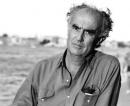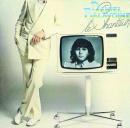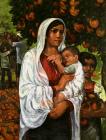ניט קײן ראָזינקעס, ניט קײן מאַנדלען - לולינקע
Yeshayahu Shpigl [Isaiah Spiegel] / אישיהו שפּיגלLangue: yiddish
ניט קײן ראָזינקעס, ניט קײן מאַנדלען,
דער טאַטע איז ניט געפֿאָרן האַנדלען,
לולינקע מײַן זון.
ער האָט פֿאַרלאָזט אונדז און אַװעק
װוּ די װעלט האָט נאָר אַן עק
לולינקע מײַן זון
שרײַען סאָװעס, שװױענ װעלף,
גאָט, דערבאַרעם זיך און העלף
לולינקע מײַן זון
ערגעץ שטײט ער און ער װאַכט,
מאַנדלען, ראָזינקעס אַ סך
לולינקע מײַן זון
ניט קײן ראָזינקעס, ניט קײן מאַנדלען,
דער טאַטע איז ניט געפֿאָרן האַנדלען,
לולינקע מײַן זון
קומען רבֿת אױף זיכער שױן,
זען דיך, קינד, מײַן אײנציק קרױן,
לולינקע מײַן זון.
דער טאַטע איז ניט געפֿאָרן האַנדלען,
לולינקע מײַן זון.
ער האָט פֿאַרלאָזט אונדז און אַװעק
װוּ די װעלט האָט נאָר אַן עק
לולינקע מײַן זון
שרײַען סאָװעס, שװױענ װעלף,
גאָט, דערבאַרעם זיך און העלף
לולינקע מײַן זון
ערגעץ שטײט ער און ער װאַכט,
מאַנדלען, ראָזינקעס אַ סך
לולינקע מײַן זון
ניט קײן ראָזינקעס, ניט קײן מאַנדלען,
דער טאַטע איז ניט געפֿאָרן האַנדלען,
לולינקע מײַן זון
קומען רבֿת אױף זיכער שױן,
זען דיך, קינד, מײַן אײנציק קרױן,
לולינקע מײַן זון.
envoyé par Riccardo Venturi - 2/7/2006 - 13:54
Langue: yiddish (Romanized)
Il testo originale yiddish in trascrizione latina. Proviene da questa pagina, ma è stato adattato in alcuni punti alle convenzioni in uso in questo sito, che corrispondono con la trascrizione ufficiale YIVO (nessun conto viene dato qui né alla trascrizione Birnbaum, né a trascrizioni di altro tipo). [RV]
NIT KEYN ROZINKES, NIT KEYN MANDLEN [LULINKE]
Nit keyn rozinkes un nit keyn mandlen
der tate iz nit geforn handlen
Lulinke mayn zun
Er hot farlozt undz un avek,
vu di velt hot nor an ek
Lulinke mayn zun
Shrayen soves, shvoyen velf,
Got, derbarem zikh un helf,
Lulinke mayn zun
Ergets shteyt er un er vakht,
Mandlen, rozinkes a sakh
Lulinke mayn zun
Nit keyn rozinkes un nit keyn mandlen
der tate iz nit geforn handlen
Lulinke mayn zun
Kumen revet oyf zikher shoyn,
zen dikh, kind, mayn eyntsik kroyn,
Lulinke mayn zun.
Nit keyn rozinkes un nit keyn mandlen
der tate iz nit geforn handlen
Lulinke mayn zun
Er hot farlozt undz un avek,
vu di velt hot nor an ek
Lulinke mayn zun
Shrayen soves, shvoyen velf,
Got, derbarem zikh un helf,
Lulinke mayn zun
Ergets shteyt er un er vakht,
Mandlen, rozinkes a sakh
Lulinke mayn zun
Nit keyn rozinkes un nit keyn mandlen
der tate iz nit geforn handlen
Lulinke mayn zun
Kumen revet oyf zikher shoyn,
zen dikh, kind, mayn eyntsik kroyn,
Lulinke mayn zun.
Langue: anglais
La traduzione inglese tratta da questa pagina. Fino ad oggi [12.2.07] era stata l'unico testo presente prima del reperimento dell'originale in yiddish. Si tratta di una tradizione d'arte cantabile.
NOT THE RAISINS
Not the raisins nor almonds either
Did Father leave to go and see there,
Lullaby my son.
He left us and went far away
To where the darkness meets the day,
Lullaby my son.
Owls are hooting, wolves are baying,
G-d have mercy, hear my praying,
Lullaby my son.
Somewhere he may stand and wait,
Almonds, raisins fill his plate,
Lullaby my son.
Not the raisins nor almonds either
Did Father leave to go and see there,
Lullaby my son.
One day soon I know he'll come
To visit you, his dearest one,
Lullaby my son.
Not the raisins nor almonds either
Did Father leave to go and see there,
Lullaby my son.
He left us and went far away
To where the darkness meets the day,
Lullaby my son.
Owls are hooting, wolves are baying,
G-d have mercy, hear my praying,
Lullaby my son.
Somewhere he may stand and wait,
Almonds, raisins fill his plate,
Lullaby my son.
Not the raisins nor almonds either
Did Father leave to go and see there,
Lullaby my son.
One day soon I know he'll come
To visit you, his dearest one,
Lullaby my son.
envoyé par Riccardo Venturi - 12/2/2007 - 22:13
Langue: anglais
La seguente è invece la traduzione inglese letterale
A word-for-word English translation of the song
A word-for-word English translation of the song
NO MORE RAISINS, NO MORE ALMONDS [LULINKE]
No more raisins, no more almonds,
Your father has not gone out trading,
Hushaby, my son.
He's gone away and left us here,
Gone to the ends of the earth,
Hushaby, my son.
Owls are screeching, wolves are howling,
G-d have mercy and hear us calling,
Hushaby, my son.
He's standing somewhere watching us,
Almonds, raisins, quite a lot,
Hushaby, my son.
No more raisins, no more almonds,
Your father has not gone out trading,
Hushaby, my son.
He's sure to come back very soon
To you, my child, my jewel, my crown,
Lulinke, my son.
No more raisins, no more almonds,
Your father has not gone out trading,
Hushaby, my son.
He's gone away and left us here,
Gone to the ends of the earth,
Hushaby, my son.
Owls are screeching, wolves are howling,
G-d have mercy and hear us calling,
Hushaby, my son.
He's standing somewhere watching us,
Almonds, raisins, quite a lot,
Hushaby, my son.
No more raisins, no more almonds,
Your father has not gone out trading,
Hushaby, my son.
He's sure to come back very soon
To you, my child, my jewel, my crown,
Lulinke, my son.
envoyé par Riccardo Venturi - 12/2/2007 - 22:16
Langue: italien
Versione italiana letterale (dall'inglese)
di Riccardo Venturi, 12.2.07
di Riccardo Venturi, 12.2.07
NON PIU' UVETTA, NON PIU' MANDORLE (LULINKA)
Non più uvetta, non più mandorle,
tuo padre non è andato via per lavoro
ninna nanna, figlio mio.
E' andato via e ci ha lasciati qui,
è andato ai confini del mondo,
ninna nanna, figlio mio.
I gufi gracchiano, i lupi ululano,
Dio, abbi pietà e ascolta le nostre preghiere
ninna nanna, figlio mio.
È da qualche parte a vegliar su di noi
uvetta, mandorle, ne ha così tante,
ninna nanna, figlio mio.
Non più uvetta, non più mandorle,
tuo padre non è andato via per lavoro,
ninna nanna, figlio mio.
Sicuramente tornerà presto
da te, figlio mio, mio gioiello, mia corona,
ninna nanna, figlio mio.
Non più uvetta, non più mandorle,
tuo padre non è andato via per lavoro
ninna nanna, figlio mio.
E' andato via e ci ha lasciati qui,
è andato ai confini del mondo,
ninna nanna, figlio mio.
I gufi gracchiano, i lupi ululano,
Dio, abbi pietà e ascolta le nostre preghiere
ninna nanna, figlio mio.
È da qualche parte a vegliar su di noi
uvetta, mandorle, ne ha così tante,
ninna nanna, figlio mio.
Non più uvetta, non più mandorle,
tuo padre non è andato via per lavoro,
ninna nanna, figlio mio.
Sicuramente tornerà presto
da te, figlio mio, mio gioiello, mia corona,
ninna nanna, figlio mio.
envoyé par Riccardo Venturi - 12/2/2007 - 22:38
×
![]()







[1941]
Lyrics by Yeshayahu Spiegel
Music by David Beyglman
Testo di Yeshayahu Spiegel
Musica di David Beyglman
Con il titolo di Lulinka ("Ninna-nanna"), il testo originale yiddish è stato cantato dagli 'Zuf de Žur nell'album Lasciapassare.
David Beyglman (1887-1945) fu violinista, compositore e critico teatrale. Era nato da una famiglia di Łódź composta in gran parte da musicisti; scrisse sinfonie e canzoni che descrivevano la vita nel ghetto di Łódź. Fu deportato a Auschwitz nel 1944, poi mandato in un campo di lavoro dove morì nel febbraio del 1945.
Written in the Łódz Ghetto soon after the death of the poet's little son, Chava. First performed by the singer Ella Diamant at the opening of the Cultural Center in the Ghetto, and sung by the Jews of Łódz, although banned by the head of the Judenrat (German-sponsored Jewish Council).
David Beigelman (1887-1945), violinist, conductor, composer, and theater critic, born into a large musical family in Lodz; wrote orchestra works and songs describing life in the Lodz ghetto and conducted concerts; deported to Auschwitz in 1944, then sent to a slave labor camp, where he died in February, 1945.
Il testo originale yiddish si trova a questa pagina nella versione traslitterata in alfabeto latino. E' stato qui riportato nell'alfabeto originale. [RV]